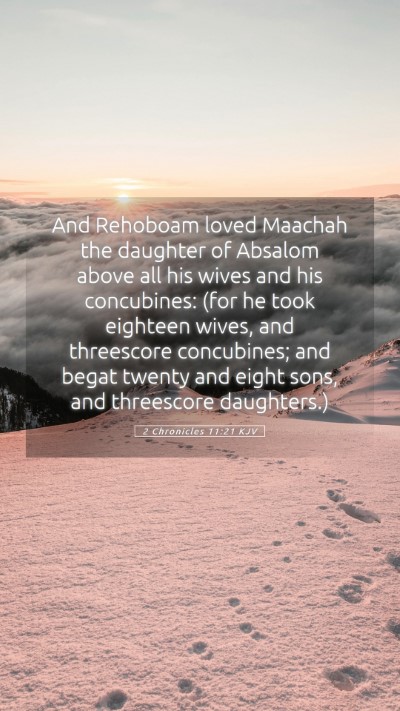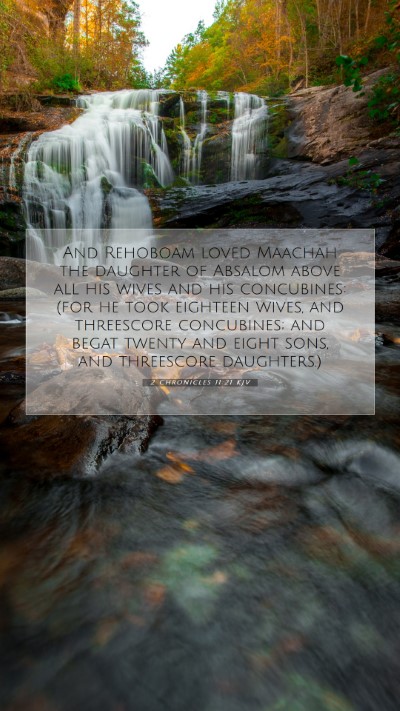Bible Verse Meaning: 2 Chronicles 11:21
This verse highlights the significance of King Rehoboam in the context of his reign over Judah. It illustrates his character and priorities, particularly his commitment to nurturing a large family and strengthening his kingdom, which reflected both personal ambition and divine providence.
General Overview
In 2 Chronicles 11:21, we read about Rehoboam, the son of Solomon, who chose to marry many wives and have numerous children. This decision can be understood as part of the ancient Near Eastern practice of kings consolidating power through alliances formed by marriage.
Interpretation by Commentators
- Matthew Henry:
Henry emphasizes the importance of family in Rehoboam's life, suggesting that while his actions might seem secular, they had deeper implications for his lineage and the stability of his reign. He interprets this as a reflection of God's provision amidst the trials faced by Rehoboam.
- Albert Barnes:
Barnes points out that Rehoboam's multitude of wives and children can denote strength but also suggests a divergence from God's intended path for kings. He warns that Rehoboam's unions might lead to spiritual disintegration, reflecting on the broader implications of such choices.
- Adam Clarke:
Clarke provides a detailed discussion about the cultural context of Rehoboam's marriages. He argues that these relationships were often aimed at political advantage; thus, Rehoboam's actions should be seen as utilizing tradition for his kingdom's security rather than solely for personal pleasure.
Key Themes in 2 Chronicles 11:21
- Family and Leadership:
Rehoboam's large family signifies the importance placed on familial strength as a method of securing leadership and legitimacy in his kingdom.
- Covenant and Covenant People:
This verse implies God's ongoing covenant relationship with Israel, signifying that despite Rehoboam's decisions, God remains invested in the lineage and the eventual restoration of His people.
- Wisdom vs. Folly:
Rehoboam's choices bring to light the dichotomy of wise decisions versus choices driven by worldly logic and pressure, serving as a commentary on the nature of kingship in Israel.
Application to Daily Life
Understanding this verse in the context of contemporary life reminds us of the responsibility that comes with leadership. Whether in our families, workplaces, or communities, we are called to make choices that reflect wisdom and consideration for future generations.
Bible Study Insights
For those engaging in Bible study groups or seeking Bible study resources, this verse can serve as a profound discussion starter on the implications of familial responsibilities, the nature of power, and the need for divine guidance in leadership roles.
Cross References
- 1 Kings 11:1-3 - Discusses Solomon’s marriages and their impact on Israel.
- Deuteronomy 17:17 - Guidelines on kings and their families.
- 2 Chronicles 9:25 - The wealth and power of King Solomon as a backdrop.
- Matthew 1:12 - The importance of genealogies in the Bible, connecting Rehoboam to Jesus.
- Jeremiah 22:30 - A prophecy regarding Jeconiah, connected through the Davidic line.
Conclusion
2 Chronicles 11:21 invites readers to reflect on the balance between personal desires and responsibilities as leaders. By interpreting this scripture through various lenses, including historical context and personal application, we can appreciate the multifaceted nature of biblical teachings.


